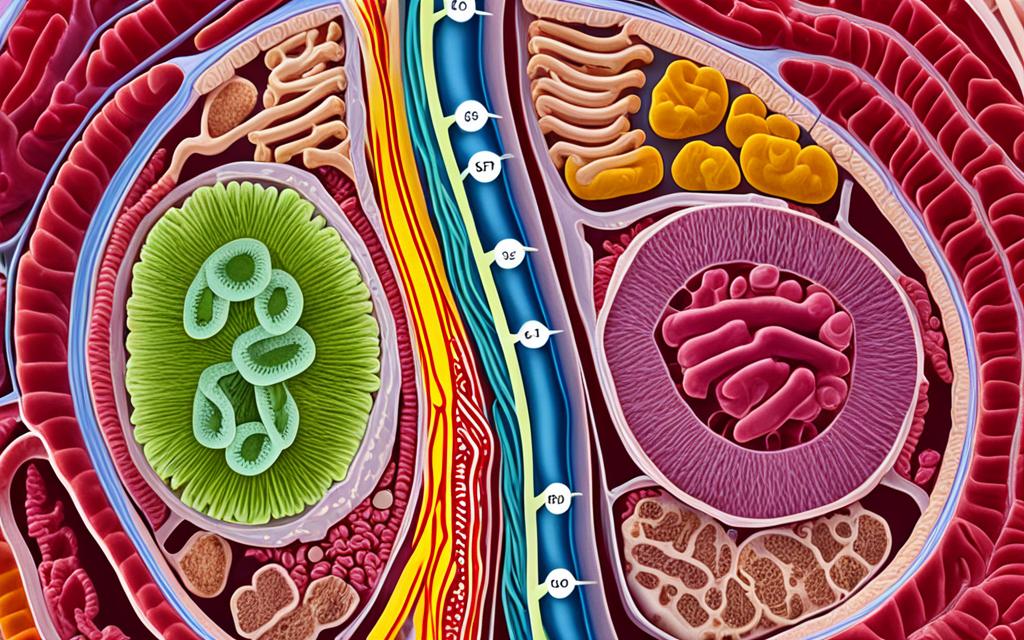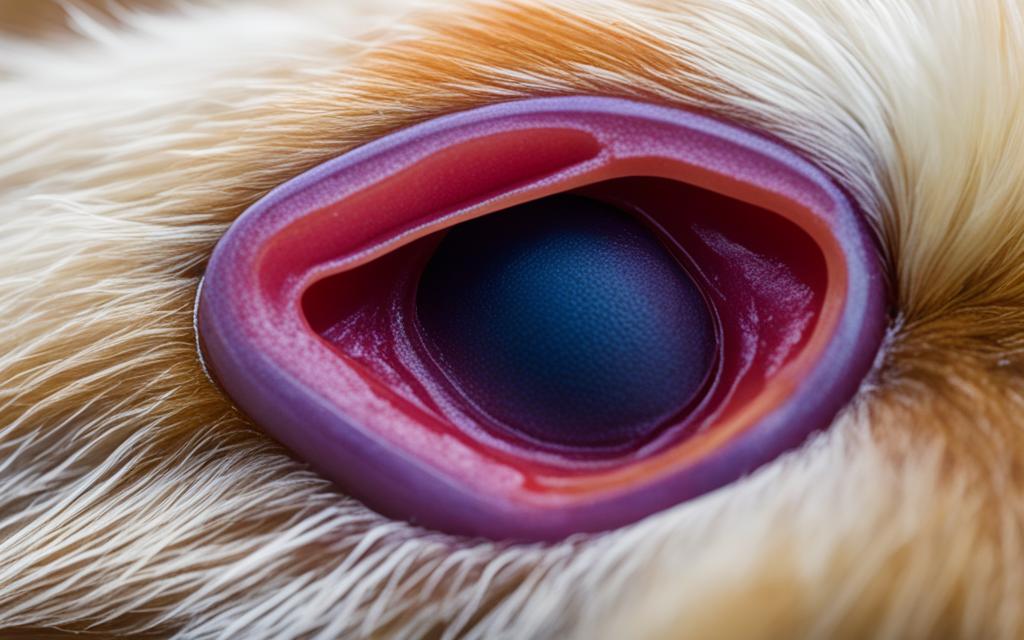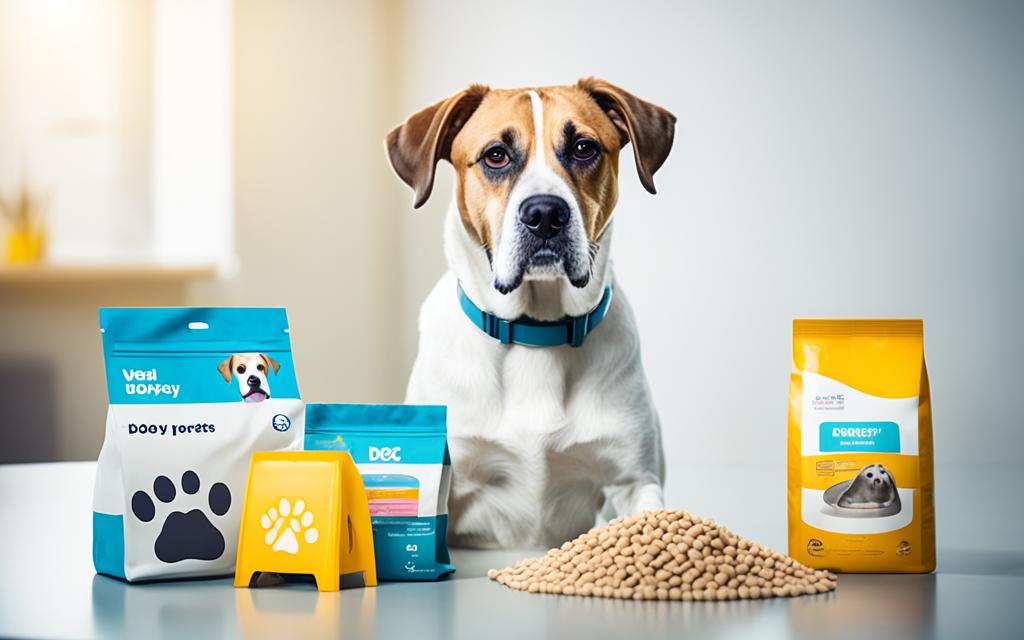It’s crucial to understand dog digestive disorders for your pet’s health and happiness. Many pet owners don’t know how digestive issues can affect their dog’s life. By spotting the signs early, you can help your dog feel better and avoid bigger problems later.
Knowing how to manage these issues can make your dog healthier and happier. It also helps reduce the discomfort they feel from digestive problems.
Understanding Canine Digestive Health
Canine digestive health is key to a dog’s overall well-being. A healthy digestive system breaks down food well and absorbs essential nutrients. It’s important for pet owners to know how digestion works to keep their dogs happy and healthy.
Importance of Digestive Health in Dogs
Good digestive health is crucial. It boosts energy, helps with weight, and supports a strong immune system. Owners should focus on their dog’s diet, including fiber and water, to keep digestion and health in check.
Common Digestive Issues in Dogs
Dogs often face digestive problems like diarrhea, vomiting, or bloating. These signs might mean there’s a bigger issue that needs quick action. Spotting these early can lead to better health for dogs in the long run.
| Digestive Issue | Symptoms | Potential Causes |
|---|---|---|
| Diarrhea | Loose stools, frequent bathroom trips | Dietary changes, infections, allergies |
| Vomiting | Regurgitation, loss of appetite | Indigestion, toxicity, systemic disease |
| Bloating | Abdominal swelling, discomfort | Overeating, gas buildup, gastrointestinal issues |
Signs and Symptoms of Digestive Disorders
It’s important to know the signs of digestive disorders in dogs. Watching for both behavior and physical changes helps. This way, you can catch health issues early and help your pet.
Behavioral Changes to Watch For
Behavior changes can hint at digestive problems. Look out for these signs:
- Decreased appetite or refusal to eat
- Unusual eating patterns, such as eating too quickly or picking at food
- Lethargy or a decrease in energy levels
- Restlessness or excessive pacing
- Uncharacteristic aggression or irritability
Physical Symptoms Indicating Digestive Problems
Physical signs often go hand in hand with behavior changes. Keep an eye on these:
- Vomiting, which may occur sporadically or frequently
- Diarrhea, varying in consistency and frequency
- Changes in stool consistency, such as mucus or blood present
- Signs of discomfort, like bloating or whining when touched
- Weight loss or noticeable changes in body condition
Pay attention to these digestive disorder signs and talk often with your vet. Spotting changes early can make a big difference in your dog’s health.
Identifying and Managing Dog Digestive Disorders
Spotting and fixing digestive problems in dogs takes a few steps. It’s key to watch your dog’s eating habits and symptoms closely. Keeping a log of these can help find patterns or things that make their digestion worse.
Steps for Accurate Diagnosis
Start by watching how much your dog eats, the quality of their poop, and any changes in how they act. Noting down times they vomit, have diarrhea, or seem tired is important. This can point to health issues. Talk to your vet about what you’ve seen to help figure out what’s wrong.
- Track your dog’s food intake and any dietary changes.
- Observe for any unusual behaviors or physical symptoms.
- Document frequency and consistency of bowel movements.
- Stay vigilant about additional symptoms like weight loss or dehydration.
When to Consult a Veterinarian
If symptoms don’t get better or get worse, seeing a vet quickly is key. Early help is important for keeping your dog’s digestive health in check. If your dog is vomiting a lot, seems really tired, or looks like they’re in pain, don’t wait to call the vet. This ensures they get the right care.
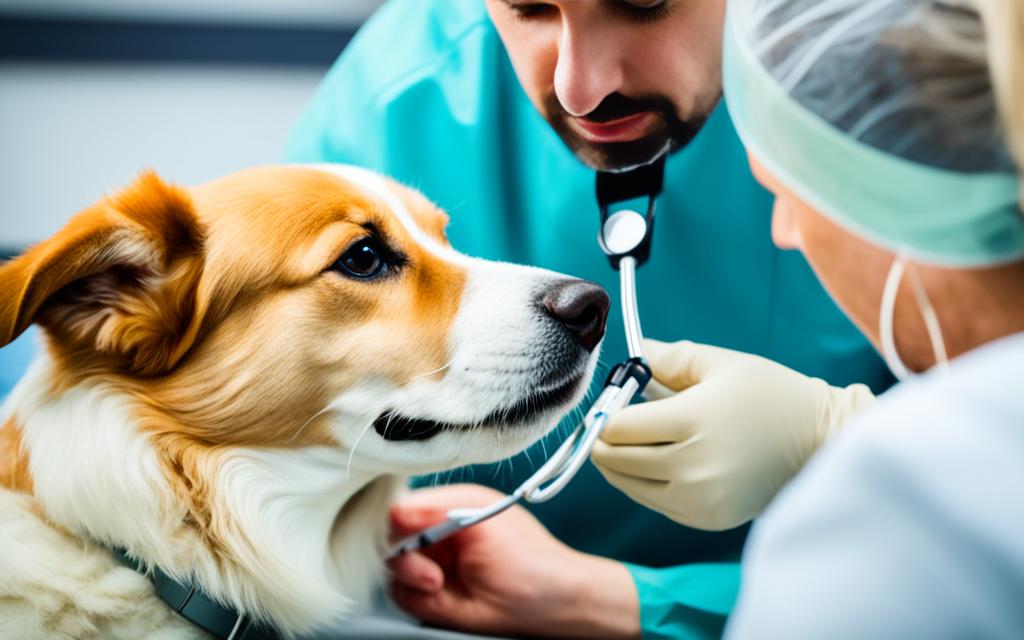
Common Types of Digestive Disorders in Dogs
It’s important to know about common digestive disorders in dogs. Conditions like gastroenteritis, food allergies, and pancreatitis are key ones. Each has its own symptoms, causes, and ways to treat it.
Gastroenteritis
Gastroenteritis means the stomach and intestines are inflamed. Dogs may vomit, have diarrhea, and feel pain in their belly. It can come from infections, eating something they shouldn’t, or toxins. To help, they might not eat for a while, have a soft diet, and drink lots of water.
Food Allergies and Intolerances
Food allergies can make dogs have upset stomachs, itch, or skin problems. Finding out what they’re allergic to can be hard. You might need to try different foods to see what’s causing the issue. Then, you should avoid that food to keep them from getting sick again.
Pancreatitis
Pancreatitis is when the pancreas gets inflamed. It can happen from eating too much fat or other diet issues. Dogs might feel pain in their belly, be tired, and throw up. To help, they need to eat less fat and might need medicine for pain and inflammation. Catching it early and treating it right is important to prevent more problems.
| Digestive Disorder | Symptoms | Common Causes | Treatment Options |
|---|---|---|---|
| Gastroenteritis | Vomiting, diarrhea, abdominal pain | Infections, dietary indiscretion, toxins | Bland diet, hydration, temporary fasting |
| Food Allergies | Gastrointestinal upset, itching, skin issues | Specific protein or ingredient sensitivities | Elimination diet, avoiding allergens |
| Pancreatitis | Abdominal pain, lethargy, vomiting | High-fat meals, dietary imbalances | Low-fat diet, medications for inflammation |
Causes of Digestive Disorders in Dogs
It’s important for pet owners to know why dogs get digestive issues. These problems can come from what they eat and their environment. Knowing the causes helps owners make better health choices for their pets.
Dietary Factors and Nutritional Deficiencies
What a dog eats greatly affects their stomach health. Eating too many new foods, eating low-quality food, or not getting enough nutrients can cause digestive problems. Dogs may get upset stomachs or other gut issues if their diet changes suddenly.
Also, not getting the right nutrients can lead to more health problems. This makes digestive issues worse.
Environmental Influences
Things around a dog can also affect their digestion. Stress from things like moving, new pets, or loud noises can mess with their eating habits. It can also make digestion harder.
Being around harmful chemicals or bad food can cause quick digestive problems. Knowing about these things helps owners make a safe place for their dogs.
| Causes of Digestive Issues | Description |
|---|---|
| Dietary Changes | Sudden shifts in a dog’s diet can lead to gastrointestinal upset. |
| Low-Quality Food | Foods lacking essential nutrients can cause digestive disturbances. |
| Stress | Environmental triggers can lead to anxiety, affecting digestion. |
| Toxins | Exposure to harmful substances can result in acute digestive issues. |
Diagnostic Procedures for Digestive Disorders
When a dog shows signs of digestive problems, vets use different tests to find the cause. They use vet exams, lab tests, and imaging to help. This helps pet owners understand what’s happening during the check-up.
Veterinary Examinations
A detailed vet check is the first step in spotting digestive issues. The vet looks at the dog’s health history, diet, and does a physical check. This might include:
- Checking the belly for tenderness or swelling
- Listening for strange sounds from the digestive system
- Looking for signs of dehydration
This helps decide what tests might be needed next.
Laboratory Tests and Imaging
After the exam, lab tests are key to confirm digestive problems. Tests might include:
- Blood tests to check organ function and spot conditions
- Fecal tests for parasites or bacterial infections
Imaging is also vital for complex cases. X-rays and ultrasounds show problems in the digestive tract that aren’t seen during exams. These tests give important clues about a dog’s health and help diagnose issues.
Managing Dog Digestive Disorders at Home
Managing your dog’s digestive issues at home is often possible. Simple diet changes and careful monitoring can make a big difference. Knowing how to make these changes and when to get expert advice is key.
Dietary Changes and Recommendations
Changing your dog’s diet is a crucial step in improving their digestive health. Feeding them foods that are easy to digest can help. Here are some diet tips:
- Incorporate bland foods such as boiled chicken, rice, or pumpkin into their meals.
- Gradually transition to a high-quality, balanced diet tailored for their specific digestive needs.
- Investigate the option of low-fat dog food if your dog is prone to pancreatitis.
- Avoid sudden changes in diet to prevent further gastrointestinal upset.
Monitoring Your Dog’s Health
Keeping an eye on your dog’s health is important. Watch for any changes in their behavior or physical signs. This can help spot problems early. Key things to watch for include:
- Changes in appetite or drinking habits.
- Variations in bowel movements, such as consistency or frequency.
- Any signs of discomfort, like excessive barking or hiding.
- Weight fluctuations that may signal underlying issues.
Talking regularly with your vet is crucial. If you notice changes, don’t wait to get advice. Following these dietary tips and monitoring your dog’s health helps keep them well.
| Dietary Changes | Benefits |
|---|---|
| Bland Diet | Soothes the digestive system |
| High-Quality Food | Nutrient-rich for gut health |
| Low-Fat Options | Reduces the strain on the pancreas |
| Gradual Transitions | Prevents gastrointestinal stress |
Medication and Treatment Options
When dogs have digestive problems, there are many ways to help them feel better. It’s good to look at both traditional and natural ways to treat them. This way, you can take care of their digestive issues and help them stay healthy overall.
Common Medications for Digestive Issues
Vets often give dogs special medicines for their digestive problems. These medicines help with symptoms and fix the root cause. Some common medicines include:
- Antacids to reduce stomach acidity
- Probiotics to support gut health
- Digestive enzymes to improve food breakdown
- Anti-diarrheal medications for gastrointestinal relief
- Antibiotics for bacterial infections
Always talk to a vet to find the best medicine for your dog. They can guide you to the right treatment to avoid side effects.
Holistic and Alternative Treatments
More pet owners are trying holistic treatments for their pets. These methods use natural remedies that can work with traditional medicines. Some popular holistic treatments are:
- Herbal remedies such as ginger or peppermint
- Specialized diets tailored for digestive health
- Aromatherapy and acupuncture for stress reduction
- Supplementing with omega fatty acids for inflammation
Using both holistic and traditional treatments can help your dog get better. It’s important to talk to a vet who knows about holistic care before trying these options.
| Treatment Type | Description | Ideal For |
|---|---|---|
| Antacids | Reduces stomach acidity, easing discomfort | Dogs with acid reflux |
| Probiotics | Promotes healthy gut flora | Post-antibiotic treatment |
| Herbal Remedies | Natural options like ginger for nausea | Dogs needing gentle digestive support |
| Specialized Diets | Formulated food for sensitive stomachs | Dogs with food sensitivities or allergies |
Using a mix of medicines and holistic treatments can really help your pet’s digestion. Always get advice from a professional before choosing treatments.
Preventive Care for Digestive Health
Keeping dogs’ digestive health in check needs regular care. Regular vet check-ups are key for spotting problems early. This way, pet owners can stop issues before they get worse, keeping their pets healthy.
Importance of Regular Vet Check-ups
Regular vet visits are crucial for dogs’ health. They let vets check on a dog’s health and catch digestive issues early. Dogs might show signs of digestive problems that are easy to miss. Routine checks, like weighing them and checking their diet, keep them feeling their best.
Healthy Diet and Lifestyle Choices
Feeding your dog a healthy diet is key for their digestive health. A balanced diet full of nutrients can help avoid many digestive problems. Adding high-quality proteins, whole grains, and fresh veggies helps a lot. Plus, regular exercise boosts digestion and makes life better for dogs.
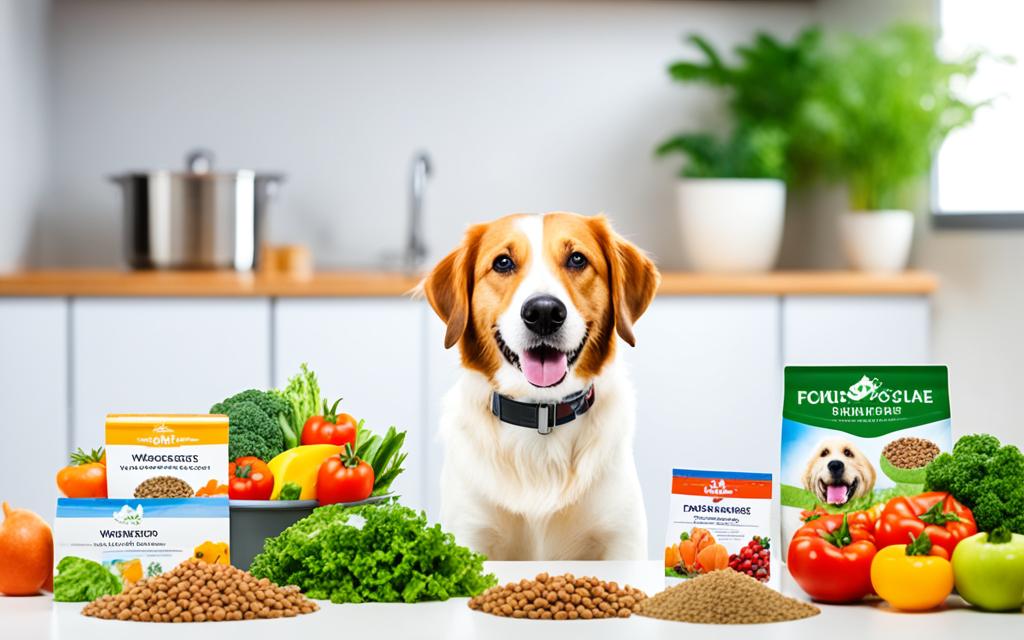
| Preventive Measures | Description |
|---|---|
| Regular Vet Check-ups | Annual or biannual visits to the veterinarian for health assessments. |
| Balanced Diet | Feeding a nutrient-rich diet tailored to the dog’s needs. |
| Daily Exercise | Engaging in physical activities to support digestive health. |
| Observe Behavior | Monitoring changes in appetite or bowel movements as early indicators. |
Supplements to Support Digestive Health
Keeping a dog’s digestive system healthy is more than just feeding them right. Supplements for dogs are key in boosting gut health and overall health. This part looks into how probiotics and fiber supplements can help with digestion.
Probiotics and Their Benefits
Probiotics are live microorganisms that are good for health when taken in the right amounts. They help balance gut flora, lessen stomach upset, and boost the immune system. These supplements are great after antibiotics or when changing a dog’s diet. Adding probiotics regularly can lead to:
- Better digestion and nutrient use
- Less diarrhea
- Helping with food allergies
Fibre Supplements for Dogs
Fiber is key for good digestion. Fiber supplements are important for keeping bowel movements regular and preventing constipation. They feed the good bacteria in the intestines. The main benefits of fiber supplements are:
- Better stool quality and consistency
- Helping with weight control
- Keeping the gut healthy, lowering the chance of stomach problems
When thinking about supplements for your dog’s digestion, talk to a vet. They can suggest the best probiotics and fiber supplements for your dog. They can also make sure you’re giving the right amount.
| Supplement Type | Benefits | Considerations |
|---|---|---|
| Probiotics | Boosts gut health and immune function | Consult vet for right strains and amounts |
| Fiber | Helps with regular digestion and feeling full | Change amount based on diet and size |
Conclusion
It’s key to spot and handle digestive issues in dogs to keep them healthy. Knowing the signs and causes helps owners act fast. This article has shown how paying attention to your dog’s health can make a big difference.
This summary on dog digestive disorders stresses the need to watch for changes in behavior and health. By using the tips given, owners can help their dogs stay happy and lively. Regular vet visits and the right diet are key for good digestion.
Finally, making sure your dog’s digestive system is healthy is a big part of being a good pet owner. It helps your pet feel good and live a long life. Let this advice help you make sure your dog has a great life.
